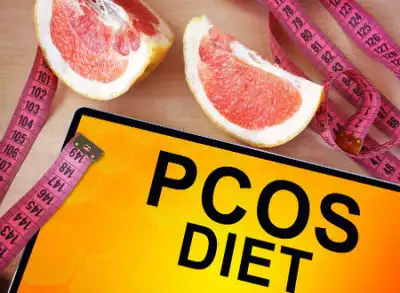Mindful eating to maintain diet plan for PCOS/PCOD in Kolkata
For women of childbearing age, the most prevalent hormonal imbalance is known as polycystic ovarian syndrome, or PCOS. Women with PCOS account for 80% of those who have insulin resistance.
High blood sugar levels brought on by insulin resistance can increase appetite, make you crave sweets, and ultimately result in weight gain. Moreover, it may result in diabetes and heart problems.
Eating meals is often done automatically, while under stress or distraction. On busy days, it may even seem like a chore. In the finish line, this can result in a general detachment from food, signals of hunger and fullness, and enjoying meals.
Comparing women with PCOS to those without, they find that the former is more than three times as likely to be identified as having an eating disorder and to engage in disordered eating behaviours. Numerous factors, including weight cycling, dieting, contradicting nutritional advice, increased cravings for carbohydrates, and weight loss recommendations, may contribute to this elevated risk. Including mindfulness exercises in daily life can help promote a positive relationship with food and increase meal satisfaction.
What is the healthy meal practice?
Based on your schedule and a proper PCOS/PCOD diet consultation in Kolkata, eat at designated times. Eat every 4-5 hours maximum between meals. Missing meals can lead to blood sugar fluctuations and overeating later.
Provide wholesome snacks that include two food groups and meals that include at least three food groups. See the following list of snack ideas:
· Celery or applesauce with peanut butter
· Greek yogurt paired with whole grain cereal or blueberries; hard-boiled egg paired with whole grain crackers or pretzels; fruit paired with string cheese
· Nutty snacks like almonds or walnuts, ¼ cup; carrots or celery with hummus; wasabi pea or soy nuts, ¼ cup; low-fat cottage cheese paired with sliced fruit or tomato; Edamame
· Everyone's definition of mindful eating varies depending on their starting point, schedule, and personal preferences.
Select meals and beverages with a sugar content of no more than 8 grammes per serving. Select legumes, beans, peas, fruit, and whole grains. Try lentil soup, brown rice, quinoa, split peas and muesli. These foods are more satisfying and have a higher fibre content. Pick "good" fat-rich foods like nuts, tuna, salmon, and ground flaxseed.
Any food is acceptable as long as you eat portions carefully. Suppose your plate is composed of one-quarter to one-half whole grains, zero to one-quarter fruit, a quarter of protein, and one-quarter of vegetables. Limiting the protein amount you eat from other, less healthful foods can be achieved by stuffing yourself with foods high in whole grains, protein, and healthy fats.
Engage in mindful eating. Eat with pleasure and avoid using a screen. Overeating can result from eating while distracted.
Add greater mindfulness to your meal with a PCOS/PCOD diet plan offered by Dt. Rukhsana Azhar from Diet4u Wellness:
· Timing: Pick one meal a day, or a single meal a week, where you can take your time and enjoy the meal as much as you would at a restaurant. You can enjoy a solo experience by turning on music or a podcast, or you can invite friends or family over for a stimulating conversation.
· Setting: Consider altering your dining space by putting a candle on the table, sitting outside, or serving food on a lovely dish.
· Calm: Begin the meal with 3 deep belly breaths to set the intention of eating more slowly and peacefully. Enjoy your meal by paying attention to the meal before you and allowing yourself to take a break from the stresses of your everyday life.
· Reducing Distractions: Think about the things that usually divert your attention during mealtimes. While some may be under your control, others might be trickier. Begin each meal with 3 unhindered bites rather than eliminating all distractions at once. You'll enjoy your meal more and be more aware of your satiety cues if you finish it without interruptions.
· Contentment: Eating healthily should be varied! Consider what flavours, textures, and scents you are craving in order to concentrate on preparing meals that fulfil your needs. Based on your level of hunger, decide whether a hot or cold meal sounds more appetizing, and try to prepare a nutritious meal that will keep you going.
It doesn't have to take much more extra time or work to incorporate greater mindfulness into meals. Opt for a single practice session to try yourself and record what you like and don't like about it. The main goal here is to establish a stronger bond and a more favourable relationship with food. Try a few different things to see what works for you and what makes eating more enjoyable!
Having said that, one technique to help you eat healthfully is mindful eating. Consult a nutritionist or dietitian who specialises in eating disorders for more specialised support and treatment if you have concerns about disordered eating behaviours or an eating disorder.
Steer clear of simple sugars, which are present in fruit juice, candies, ice cream, pies, cookies, and ordinary soda pop.
Conscious Eating: A Non-Diet Method suggested by a PCOS/PCOD dietitian for PCOS Weight Loss
You are not to blame for your inability to reduce weight. If you have PCOS, you are fighting a fierce war against your own body. It could seem as though you are without control over your weight, symptoms, or moods. Therapists have witnessed a great deal of intelligent, hardworking women with PCOS battle eating disorders and weight gain. With mixed results, they experiment with every diet out there. The truth is that it is tough to lose weight in the obesogenic world of today. Everywhere you look is temptation. It's pointless to try to control your cravings when you're suffering from PCOS because your willpower won't work.
You have most likely decided to go on a diet out of desperation to lose weight. But if you have PCOS, you have undoubtedly tried every diet out there, including low-carb, Paleo, and keto. In actuality, diets are ineffective. This is particularly valid for those who have PCOS.
You could work out more, but working out isn't a particularly effective way to reduce weight. Exercise is not particularly beneficial for losing weight, but it is vital for managing PCOS symptoms and your general health. A lot of exercise is required to burn off sufficient fat to make a difference.
To lose one pound, for instance, you would need to walk approximately 35 miles to ward off 3,500 calories. That is a very long way!
A third option is to do nothing and accept that your belly will continue to grow and that your trousers will become too tight.
Thus, the actual query is, "What can you do?"
Thankfully, there is a fix. a method that follows your body's natural guidance. I'm sure you've heard of it. It's known as the non-diet conduct to weight management—Mindful Eating.
With mindful eating and the help of a PCOS/PCOD dietician, you can learn to listen to your body and give it precisely what it needs at the exact moment, as opposed to following a diet that dictates what, when, and what quantity to eat. You can manage your weight without going back on a diet by practising mindful eating, which is eating with intention, purpose, and complete awareness. You can put a stop to your struggle with mindful eating by using tools like mindful meditation. Eating with awareness entails observing your meal and your feelings before, during, and following your meal. You eat fewer over time because you eat the correct foods in the right quantities, enjoy them more, and make the right food choices.
To align your body's weight regulation mechanisms, mindful eating works in harmony with these systems by focusing on internal cues instead of external ones. Binge eating and depression are reduced when eating mindfully. Mindful eating is superior to dieting as a long-term strategy. Although a diet may not guarantee rapid weight loss, the effects are more long-lasting. Do you feel prepared to try mindful eating? To get going, take these eight steps.
How-To for PCOS & PCOD Wellness: Mindful Eating
· Take a seat, inhale deeply, and concentrate on the food that is going to be consumed.
· Take stock of your feelings, being particularly aware of any hunger pangs.
· Take note of the food you've selected to consume. Take note of the way it feels, looks, and smells.
· Consider the journey this food took to reach you. Express your gratitude in silence to the participating producers, manufacturers, drivers of trucks, stock clerks, and cashiers.
· Eat slowly, taking a bite out of the meal and observing how it feels and tastes in your mouth. Take note of any taste changes.
· Eat your food for the rest of the meal, enjoying every bite.
· Throughout your meal, take stock of your intake to determine when you are comfortably full and have eaten enough.
· After you've eaten to fullness, acknowledge your mindful efforts and reward yourself.






